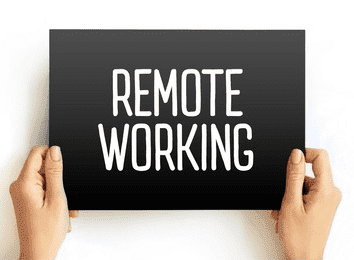Introduction
Remote work is not anymore a dream that belongs only to a few; it has genuinely crossed into the affluent global norm. From being a fresh graduate entering the workforce, changing careers, or searching for a better work-life balance, getting a remote job by 2025 is much more possible than ever before. And here’s even better news: you don’t need years of experience to land one.
In this Ultimate Guide to Getting a Remote Job in 2025, you would learn everything you need to know to start working remotely from scratch. What jobs are best suited for you? Where and how to find them? You’d also learn some of today’s most reliable tools and skills that will help you in your remote job.

1. Reason for the Rise in Remote Work in 2025
The world has essentially changed; it has created a big leap for the majority of the world’s workforce. Every industry company has provision for some hybrid and full-blown opportunities for those with multinational options. In 2025, remote work is not merely contributing to all the different types of tech jobs; it has spread into customer care, virtual assistance, sales, content creation, data entry, and many more functions all of which have now opened their doors to telecommuters.
The Ultimate Guide to Getting a Remote Job in 2025 is designed to help you take advantage of this new digital economy. There are two key factors for remote work growth: technological advancement, such as cloud tools and collaboration platforms; cost savings for companies; reaching a global talent pool; and increasing demand for flexible lifestyles.
2. Beginner-Level Remote Jobs to Start Today
It is possible to begin without a college degree or technical background. Most entry-level positions only demand a certain degree of soft skills such as communication, organization, and attention to detail.
Check out this guide to the Legit Remote Jobs You Can Do Without a Degree, Including:
- Virtual Assistant
- Content Writer
- Social Media Manager
- Customer Support Representative
- Data Entry Clerk
- Online Tutor
- Graphic Designer
- Transcriptionist
- QA Tester
- Online Researcher
They usually require a bare minimum knowledge about how to operate technology, but generally, are stepping stones into long-term careers. You’ll find these job types referenced throughout The Ultimate Guide to Getting a Remote Job in 2025.
3. Where to Look for Remote Jobs in 2025
There are dedicated websites and platforms for remote work. Most general job sites cross-reference remote with onsite roles, and that is where knowing where to look will get you key.
The platforms like:
- FlexJobs (suitable for verified postings)
- We Work Remotely
- Remote.co
- Jobspresso
- AngelList (startups)
- Working Nomads (tech-focused)
Every platform offers different benefits and a different user experience. Mastering these will put you ahead in your journey through The Ultimate Guide to Getting a Remote Job in 2025.
4. Write a Stand-Out Remote Job Resume
Your summary for a remote position has to accentuate different strengths from that of an ordinary resume. Focus on soft message about ones digital literacy and time management.
- Formatting tips for the online readability
- Inclusion of keywords from job description
- How to demonstrate remote-readiness
- Sample cover letters targeted toward remote jobs
Inclusively, you may list a few which have proven to fit the market, including Google for Work, Zoom, and Trello.
5. Using Freelance as a Starting Point for Remote Work
In case the traditional application for a job does not work, or if, for some reason, you want more flexibility, the best means to get started is through freelancing. You can create your portfolio and experience without requiring a full-time employer.
Examine the Best Sites for Freelance Work for Newcomers to Remote Work:
- Fiverr (instant gigs)
- Upwork (long-term projects)
- Freelancer
- Toptal (advanced)
- PeoplePerHour
These systems enable you to work on projects at your desired rates and get feedback for feedback ratings to build credibility.
6. Precautions Against Remote Work Scams
Not all job offers are genuine. Eager job seekers looking for remote work fall prey to scam job advertisements and phishing schemes.
Takeaway:
- Will never cover the cost of applying for or starting a job.
- Will always scan or check for websites and emails of the company.
- Vague job descriptions and over promises.
These and many more are actual examples of scams and safe job boards to trust.
7. Tools You’ll Need When You Work Remotely
It’s all about efficiency in using right tools-as this will enable adept communication, time management, and productivity.
Broadly, several categories include:
- Communication: Slack, Zoom, Google Meet
- Task Management: Trello, Asana, ClickUp
- Productivity: Notion, Evernote, Pomodoro applications
- Time Tracking: Toggl, Clockify
Mastering those tools early enough will set you apart during interviews and work itself.
8. Motivation and Concentration While Working at Home
There is a need for structure and self-discipline in maintaining motivation when one is away from attending to colleagues in person.
- Distraction-free workspace
- Adhere to a daily schedule
- Set boundaries with family or roommates
- Take worthwhile breaks to avoid burnout
You don’t have to make major changes for them to produce quite drastic improvements in the way you operate.
9. Ace Your Remote Job Interviews
Virtual interviews come with their own peculiarities-the eye contact through the camera, the background setup, and the confidence of being served without being there in the same room.
- Common interview questions for remote roles
- Sample answers and strategies
- How to effectively explain lack of experience
- Body language and tech setup tips
10. Learn from Real-Life Remote Work Stories
Nothing beats firsthand experience. But what makes reading real stories more inspirational is that it reveals practical tips and shows that remote success is attainable.
- Switched careers at 40
- Scored remote jobs without any formal degree
- Moved from freelancing to a full-time remote career
Final Thoughts : Get Started Today
The world has indeed changed. Remote work isn’t really a future-it’s now, and it has come really close to you. It doesn’t matter whether you have freelancing aspirations, seeking your first role as a virtual assistant, or applying for full-time jobs with international companies, what you already have available with you are tools and knowledge for starting these undertakings.
Here is a 3-step action plan:
- Choose a role
- Look for listings using Remote Job Websites
- Draft a winning resume
Then explore tools, avoid scams, ace interviews and start writing your own success story.
What is needed is not years of experience. What is needed is information, consistency, and belief. And right now-you’ve got all three. Let The Ultimate Guide to Getting a Remote Job in 2025 be your companion on this exciting journey.

